City of Grande Prairie Indigenous Relations Framework
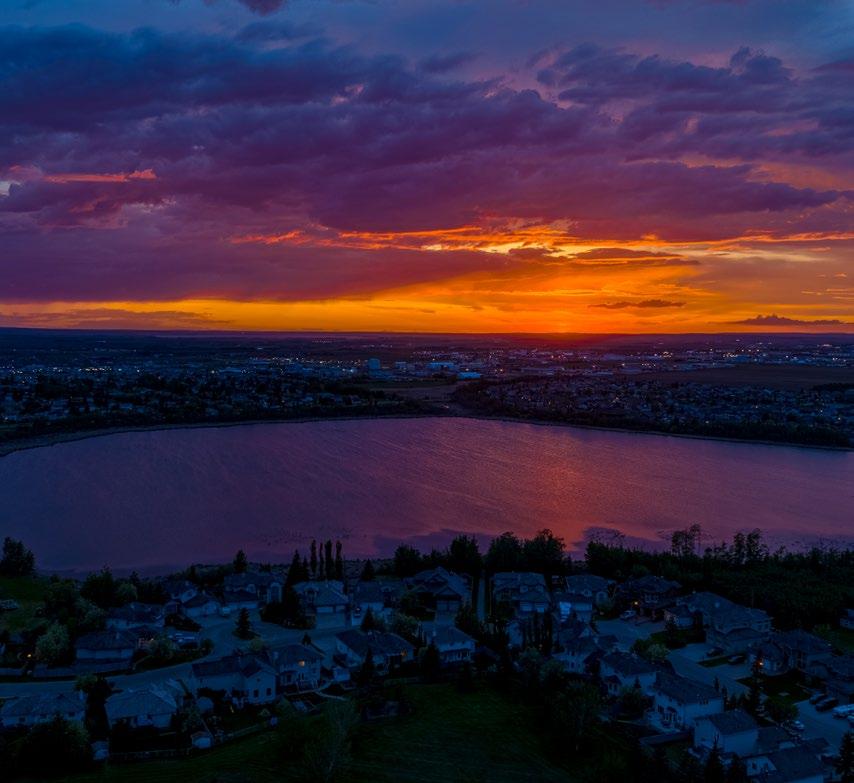
HAANACH’E / TANSI / HELLO,
The City respectfully acknowledges the Beaver, Cree, Dene and Métis people as the original caretakers of these Lands and surrounding areas. We are grateful to live, learn, work and play on Treaty 8 territory within Turtle Island and acknowledge these Lands have been home to diverse and sovereign First Nations and Inuit Nations since time immemorial.
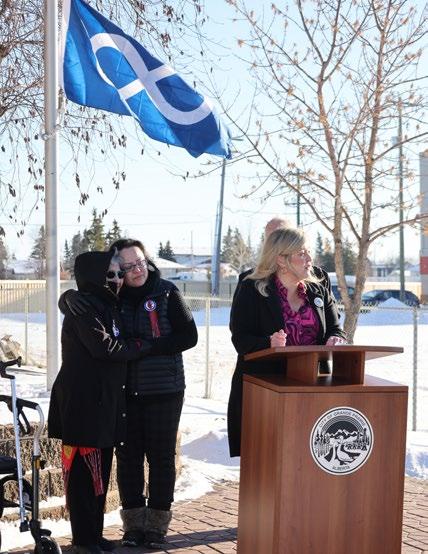
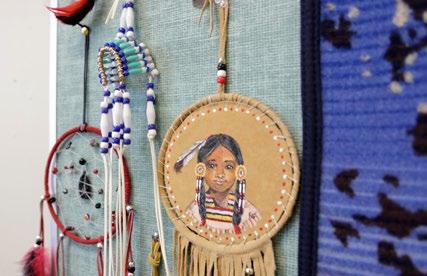

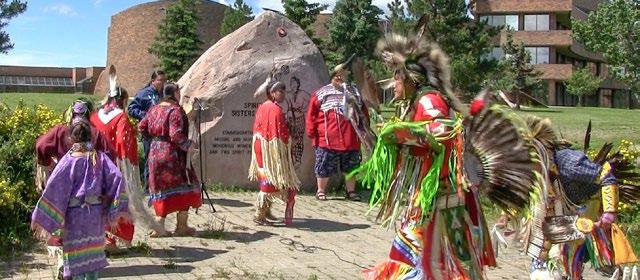
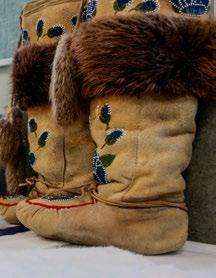
WUUJO AASANALAA / KINANÂSKOMITIN / THANK YOU
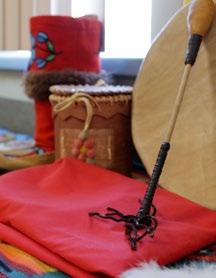 TAA
TAA
Contents Treaty 8 4 Framework 4 Framework Objectives 5 Why 5 Introduc tion 5 Focus Areas 6 Building Connec tions 7 Communit y Culture 8 Commerce & Creativity 10 City S ervices 11 Educa tion & Acknowledgement 13
The City of Grande Prairie is committed to continue working with the various Treaty 8 bands in our local area: Horse Lake First Nation, Sturgeon Lake Cree Nation and Duncan’s First Nation along with the urban Indigenous organizations to support advancing Truth and Reconciliation: 94 Calls to Action and the United Nations Declaration on the Rights of Indigenous Peoples. Treaty 8 Document

Treaty 8 Framework
The Truth and Reconciliation Commission of Canada: Calls to Action (TRC) document outlines 94 Calls to Action “in order to redress the legacy of residential schools and advance the process of Canadian reconciliation.” Along with the 94 Calls to Action, in 2016 the Government of Canada endorsed the United Nations Declaration of the Rights of Indigenous People (UNDRIP). This Framework is in response to those documents. This Framework documents how the City of Grande Prairie will support advancing Truth and Reconciliation in our local area and be leaders of change in Canada.
4
City of Grande Prairie Indigenous Relations Framework
Framework Objectives
To guide the City in fostering a community that forms respectful relationships with Indigenous and non-Indigenous people by repairing trust through individual and collective reparations. To implement TRC Calls to action that lead to positive societal change. Grande Prairie will be a leader in TRC that other cities will follow because of the initiatives, structures, and implementation of the 94 Calls to Action and UNDRIP in our City’s community culture.
Why
The City of Grande Prairie has a growing population of self-identified Indigenous people at four times the national average (12%). Our Council is invested in being a part of fostering positive change for this population and recognizing the importance of Truth and Reconciliation being at the forefront of every municipality in Canada.

Introduction
Grande Prairie is a rapidly growing city, rich in history, culture, and resources. Currently, the city is situated as the 8th largest in Alberta and continues to grow in many areas including diversity, cultural openness, and societal leaders of inclusivity. With the latest TRC: 94 Calls to Action report, Grande Prairie will implement this framework grounded in the spirit of Truth and Reconciliation. This document is to be a guide for Grande Prairie on creating equity and collaboration for urban and non-urban Indigenous people.
City of Grande Prairie Indigenous Relations Framework 5
Focus Areas
BUILDING CONNECTIONS
The City of Grande Prairie acknowledges that building relationships with local Indigenous governments and organizations is pivotal to advancing the Calls to Action for Truth and Reconciliation. Connecting with neighbouring Indigenous representatives and working toward fostering collaborative environments is an important step for building bridges to reconciliation.
COMMUNITY CULTURE
Spaces and event planning for Indigenous representation in Grande Prairie will be a part of our developing partnership. Seamlessly creating a collaborative environment for Indigenous representation throughout the city is a step toward Grande Prairie’s initiative.
COMMERCE & CREATIVITY
The City of Grande Prairie recognizes the integral role Treaties and First Nations play in Canada’s resources and development. As advocates of Indigenous development, Grande Prairie will engage with Indigenous entrepreneurs to encourage business relationships.
CITY SERVICES
Identifying how City departments can align their services to reflect areas of reconciliation. The City of Grande Prairie is committed to efforts to adapt services with a contemporary understanding of Indigenous perspectives.
EDUCATION & ACKNOWLEDGEMENT
Understanding the history and culture of Indigenous people is a priority here at the City of Grande Prairie. We strive for excellence in educating City staff and the public on Indigenous involvement with the Treaties and shaping of Canadian culture.
City of Grande Prairie Indigenous Relations Framework 6
BUILDING CONNECTIONS
The City of Grande Prairie acknowledges that building relationships with local Indigenous governments and organizations is pivotal to advancing the Calls to Action for Truth and Reconciliation. Connecting with neighbouring Indigenous representatives and working toward fostering collaborative environments is an important step for building bridges to reconciliation.
Action Item Departments Engaged TimelineInvolves TRC: Call to Action KPI
Establish regular meetings with local Indigenous governments and organizations
City Council Indigenous Relations
OngoingWorking together to find partnership opportunities.
92. We call upon the corporate sector in Canada to adopt the United Nations Declaration on the Rights of Indigenous Peoples as a reconciliation framework and to apply its principles, norms, and standards to corporate policy and core operational activities involving Indigenous peoples and their lands and resources.
Establish a community of knowledge keepers to advise initiatives in Grande Prairie to support federal, provincial, and municipal Truth and Reconciliation advancement
Engaging with the local Indigenous communities to identify the stories that can be told
Indigenous Relations
Energy and Environment Sports Development, Wellness and Culture
2023Forming an informal group of local Indigenous people knowledgeable in TRC to consult with on a regular basis.
OngoingGathering the stories for traditional Indigenous grounds.
Adding Indigenous content to the Grande Prairie Museum.
53. We call upon the Parliament of Canada, in consultation and collaboration with Aboriginal peoples, to enact legislation to establish a National Council for Reconciliation. The legislation would establish the council as an independent, national, oversight body with membership jointly appointed by the Government of Canada and national Aboriginal organizations, and consisting of Aboriginal and non-Aboriginal members.
79. We call upon the federal government, in collaboration with Survivors, Aboriginal organizations, and the arts community, to develop a reconciliation framework for Canadian heritage and commemoration. This would include, but not be limited to:
ii. Revising the policies, criteria, and practices of the National Program of Historical Commemoration to integrate Indigenous history, heritage values, and memory practices into Canada’s national heritage and history.
Encouraging recreational connections and events in both the city and surrounding First Nations communities
Sports Development, Wellness and Culture
2024Exploring with First Nations communities the possibilities of hosting city sporting events of various age groups in their home facilities.
Receiving input from rural and urban Indigenous communities on what outdoor spaces are significant or could be used for cultural initiatives
Economic Development
Energy and Environment
Facilities
2024Explore opportunities to have dedicated outdoor facilities to facilitate Indigenous events and cultural activities.
89. We call upon the federal government to amend the Physical Activity and Sport Act to support reconciliation by ensuring that policies to promote physical activity as a fundamental element of health and well-being, reduce barriers to sports participation, increase the pursuit of excellence in sport, and build capacity in the Canadian sport system, are inclusive of Aboriginal peoples.
43. We call upon federal, provincial, territorial, and municipal governments to fully adopt and implement the United Nations Declaration on the Rights of Indigenous Peoples as the framework for reconciliation.
(United Nations Declaration on the Rights of Indigenous People, Article 8.2)
Have ongoing partnerships with surrounding First Nations communities.
A list of advisors from local Indigenous communities should be formed and consulted with at regular intervals throughout the year.
Continue to work with local elders and/or knowledge keepers to develop educational programs and historical information.
Collaborate and develop strategies to increase youth sporting activities and events with Indigenous leadership. Identify and address ways to engage communities and support sharing of best practices.
Developing a needs assessment for outdoor cultural spaces and facilities.
City of Grande Prairie Indigenous Relations Framework 7
COMMUNITY CULTURE
Spaces and event planning for Indigenous representation in Grande Prairie will be a part of our developing partnership. Seamlessly creating a collaborative environment for Indigenous representation throughout the city is a step toward Grande Prairie’s initiative.
Action Item Departments Engaged
Provide community programming that relates to local indigenous culture and tradition
Sports Development, Wellness and Culture
TimelineInvolves
OngoingGrande Prairie community members should have access and exposure to Indigenous cultural programs and teachings with local Indigenous community members through municipal programming.
Grande Prairie will commit to implementing the Land Acknowledgement to commence meetings and future events for the city
All Departments Q2 2023Ensuring the Land Acknowledgement is read at key City events.
TRC: Call to Action KPI
14. We call upon the federal government to enact an Aboriginal Languages Act that incorporates the following principles:
iv. The preservation, revitalization, and strengthening of Aboriginal languages and cultures are best managed by Aboriginal people and communities.
Incorporate or incentivize Indigenous activities and knowledge sharing through educational and recreational programming.
57. We call upon federal, provincial, territorial, and municipal governments to provide education to public servants on the history of Aboriginal peoples, including the history and legacy of residential schools, the United Nations Declaration on the Rights of Indigenous Peoples, Treaties and Aboriginal rights, Indigenous law, and Aboriginal–Crown relations. This will require skills-based training in intercultural competency, conflict resolution, human rights, and anti-racism.
Host Indigenous games and sporting events
Sports Development, Wellness and Culture
OngoingIdentifying opportunities for hosting Indigenous games in the City. Researching Indigenous athletes in our area and exploring ways to recognize their accomplishments.
88. We call upon all levels of government to take action to ensure long-term Aboriginal athlete development and growth, and continued support for the North American Indigenous Games, including funding to host the games and for provincial and territorial team preparation and travel.
Adoption of the Land Acknowledgement policy by Council. Consistent Land Acknowledgement use on verbal and written occasions.
Hosting Indigenous sporting events within our community.
Seek opportunities to bid on or host Indigenous sporting events within our community.
8 City of
Relations
Grande Prairie Indigenous
Framework
COMMUNITY CULTURE
Working with Indigenous people to understand medicinal plants native to the area and understanding proper harvesting protocols
Review of existing city spaces to ensure inclusivity with Indigenous practices
Parks2023Consulting local Indigenous people.
Facilities Sports Development, Wellness and Culture
2024 Ensuring that City facilities have spaces in which Indigenous cultural traditions can be practiced. Creating inclusive spaces for Indigenous weddings, funerals, ceremonies, and faith practices.
Creating a welcoming environment for the TwoSpirited LGBTQ2+ community
Indigenous Relations Communications Sports Development, Wellness and Culture Community Social Development
2023Implementing programming and taking into account the Indigenous LGBTQ2+ community.
22. We call upon those who can effect change within the Canadian healthcare system to recognize the value of Aboriginal healing practices and use them in the treatment of Aboriginal patients in collaboration with Aboriginal healers and Elders where requested by Aboriginal patients.
48. We call upon the church parties to the Settlement Agreement, and all other faith groups and interfaith social justice groups in Canada who have not already done so, to formally adopt and comply with the principles, norms, and standards of the United Nations Declaration on the Rights of Indigenous Peoples as a framework for reconciliation.
43. We call upon federal, provincial, territorial, and municipal governments to fully adopt and implement the United Nations Declaration on the Rights of Indigenous Peoples as the framework for reconciliation. (United Nations Declaration on the Rights of Indigenous People, Article 12.1)
Developing areas in which plants native to Grande Prairie are labelled with medicinal teachings written near them.
Develop a needs assessment plan for City facilities.
The LGBTQ2+ community will be represented, when possible, at functions attended by the community.
Partner with LGBTQ2+ community to incorporate and support relevant policy, programming, training, and planning.
Item Departments Engaged TimelineInvolves TRC: Call to Action KPI
Action
9 City of
Indigenous Relations
Grande Prairie
Framework
COMMERCE & CREATIVITY
The City of Grande Prairie recognizes the integral role Treaties and First Nations play in Canada’s resources and development. As advocates of Indigenous development, Grande Prairie will engage with Indigenous economies to encourage business relationships.
Action Item Departments Engaged
Collaborating with local Indigenous artists and youth to implement Indigenous art around Grande Prairie
Planning and Development Communications Sports Development, Wellness and Culture
Including opportunities for Indigenous artists to celebrate their culture at City events
Sports Development, Wellness and Culture Events and Entertainment
2024Getting in touch with local Indigenous arts and finding space for them to implement their work around the city.
83. We call upon the Canada Council for the Arts to establish, as a funding priority, a strategy for Indigenous and non-Indigenous artists to undertake collaborative projects and produce works that contribute to the city-wide reconciliation process.
Adding one piece of Indigenous artwork into a public space every 3 years.
2023Working with Indigenous artists to enhance current offerings.
92. We call upon the corporate sector in Canada to adopt the United Nations Declaration on the Rights of Indigenous Peoples as a reconciliation framework and to apply its principles, norms, and standards to corporate policy and core operational activities involving Indigenous peoples and their lands and resources.
Fostering opportunities for Indigenous entrepreneurs
Economic Development
2023Meeting with local Indigenous entrepreneurs and supporting their business ventures through InvestGP.
Facilitating connections with indigenous business owners and investors and other development partners.
92. We call upon the corporate sector in Canada to adopt the United Nations Declaration on the Rights of Indigenous Peoples as a reconciliation framework and to apply its principles, norms, and standards to corporate policy and core operational activities involving Indigenous peoples and their lands and resources. This would include, but not be limited to, the following:
ii. Ensure that Aboriginal peoples have equitable access to jobs, training, and education opportunities in the corporate sector, and that Aboriginal communities gain long-term sustainable benefits from economic development projects.
Implementing local Indigenous languages around the city
Communications Planning and Development
Sports Development, Wellness & Culture
Events & Entertainment
2023Cree and Dené words are being used around the community public areas.
14. We call upon the federal government to enact an Aboriginal Languages Act that incorporates the following principles:
i. Aboriginal languages are a fundamental and valued element of Canadian culture and society, and there is an urgency to preserve them.
Increasing the number of opportunities for Indigenous artists to be paid for their services.
Indigenous locallyowned business exposure on InvestGP channels.
Increasing the exposure community members have to Indigenous languages in public spaces of Grande Prairie and during community events.
TRC:
TimelineInvolves
Call to Action KPI
10 City
of Grande Prairie Indigenous Relations Framework
CITY SERVICES
Identifying how City departments can align their services to reflect areas of reconciliation. The City of Grande Prairie is committed to efforts to adapt services with a contemporary understanding of Indigenous perspectives.
Engaging our community’s Indigenous youth in organized programming
Community Social Development
2024Recruiting more Indigenous youth in the community to take part in the leadership opportunities (ie. Youth Advisory Committee, other City boards).
Seek out opportunities for Indigenous voices to be heard when the City consults with the public
Communications2024Developing strategies to target Indigenous audiences for consultation on city initiatives.
66. We call upon the federal government to establish multi-year funding for community-based youth organizations to deliver programs on reconciliation, and establish a national network to share information and best practices.
Indigenous youth representation at the youth council table and/ or participation in youth council planned events.
53. We call upon the Parliament of Canada, in consultation and collaboration with Aboriginal peoples, to enact legislation to establish a National Council for Reconciliation. The legislation would establish the council as an independent, national, oversight body with membership jointly appointed by the Government of Canada and national Aboriginal organizations, and consisting of Aboriginal and non-Aboriginal members. Its mandate would include, but not be limited to, the following:
iv. Promote public dialogue, public/ private partnerships, and public initiatives for reconciliation.
Develop an Indigenous Recruitment Strategy
Human Resources
2023Developing strategies to focus on recruiting Indigenous representation for City staff and City boards and commissions.
Celebrating local Indigenous culture at City facilities
Sports Development, Wellness and Culture
Facilities
7. We call upon the federal government to develop with Aboriginal groups a joint strategy to eliminate educational and employment gaps between Aboriginal and non-Aboriginal Canadians.
Greater involvement with the City’s Indigenous population during City engagement initiatives.
Creating more awareness of local Indigenous history, culture and resources
2024Identifying spaces in City facilities that currently celebrate Indigenous culture and looking for ways to enhance.
Seeking new locations to celebrate Indigenous culture.
Communications2023Including more Indigenous content on our website, social media channels and publications.
Grande Prairie Indigenous Relations Framework
79. We call upon the federal government, in collaboration with Survivors, Aboriginal organizations, and the arts community, to develop a reconciliation framework for Canadian heritage and commemoration.
Increased representation of Indigenous people employed by the City and sitting on boards and commissions.
Promote City facilities where Indigenous culture is celebrated and identify opportunities for enhancement.
Dedicated Indigenous resources section on website. Social media campaign on Truth and Reconciliation.
Item Departments Engaged TimelineInvolves TRC: Call to Action KPI
Action
79. We call upon the federal government, in collaboration with Survivors, Aboriginal organizations, and the arts community, to develop a reconciliation framework for Canadian heritage and commemoration. 11 City of
TRAINING & ACKNOWLEDGEMENT
Understanding the history and culture of Indigenous people is a priority here at the City of Grande Prairie. We strive for excellence in educating City staff and the public on Indigenous involvement with the Treaties and shaping of Canadian culture.
Action Item Departments
Bringing in Truth and Reconciliation training and Indigenous cultural awareness training
Indigenous Relations EDI Committee
2022Reaching out to Indigenous educational programming and having them facilitate training.
57. We call upon federal, provincial, territorial, and municipal governments to provide education to public servants on the history of Aboriginal peoples, including the history and legacy of residential schools, the United Nations Declaration on the Rights of Indigenous Peoples, Treaties and Aboriginal rights, Indigenous law, and Aboriginal–Crown relations. This will require skills-based training in intercultural competency, conflict resolution, human rights, and anti-racism.
Establish a collaborative effort with surrounding Indigenous communities to honour the memory of residential school children and survivors
Indigenous Relations
2025Engaging residential school survivors and their descendants in honouring their memories and stories.
75. We call upon the federal government to work with provincial, territorial, and municipal governments, churches, Aboriginal communities, former residential school students, and current landowners to develop and implement strategies and procedures for the ongoing identification, documentation, maintenance, commemoration, and protection of residential school cemeteries or other sites at which residential school children were buried. This is to include the provision of appropriate memorial ceremonies and commemorative markers to honour the deceased children.
Establish policies on how to follow traditional Indigenous protocol
Indigenous Relations
2023Meeting with urban Indigenous organizations to seek consultation and then writing policies with their advice.
64. We call upon all levels of government that provide public funds to denominational schools to require such schools to provide an education on comparative religious studies, which must include a segment on Aboriginal spiritual beliefs and practices developed in collaboration with Aboriginal Elders.
All City staff should receive training to support their understanding of Indigenous culture, history, and perspectives.
Create local Indigenous content for our community to learn the history of our area.
Sports Development, Wellness and Culture
Ongoing Consulting with local Indigenous people and nations to compile historical resources and share them with the community.
69. We call upon Library and Archives Canada to:
iii. Commit more resources to its public education materials and programming on residential schools.
The City commits to sharing the truth about residential school to the community and employees.
Members of the City of Grande Prairie are confidently able to access information on Indigenous protocol and implement the policies to host and be a part of Indigenous cultural events.
Incorporate an Indigenous lens in work plans to support program and policy development.
Develop and promote our local history and educational resources for the community.
Engaged TimelineInvolves TRC:
Call to Action KPI
12
City of Grande Prairie Indigenous Relations Framework
TRAINING & ACKNOWLEDGEMENT
Indigenous naming consultation and protocol
Parks Facilities
2023Having protocol on naming landmarks in Grande Prairie that is accessible to internal staff.
14. We call upon the federal government to enact an Aboriginal Languages Act that incorporates the following principles:
iv. The preservation, revitalization, and strengthening of Aboriginal languages and cultures are best managed by Aboriginal people and communities.
Recognize National Truth and Reconciliation Day
All Departments
Ongoing Honouring Truth and Reconciliation Day in a variety of forms.
80. We call upon the federal government, in collaboration with Aboriginal peoples, to establish, as a statutory holiday, a National Day for Truth and Reconciliation to honour Survivors, their families, and communities, and ensure that public commemoration of the history and legacy of residential schools remains a vital component of the reconciliation process.
Informing and utilizing Jordan’s Principle for First Nations children in Grande Prairie with identified health, education, or social needs.
Informing & SupportingResidential School Survivors of the name change program
Community Social Development
2023Having information readily available at locations
Indigenous community members visit in Grande Prairie.
Implement a Land Acknowledgement for Municipal staff
Community Social Development
2023 Waving a fee for residential school survivors to facilitate their name change.
Link for more info
All Departments
2023Develop a Land Acknowledgement with local Indigenous Elders and Leaders and use it consistently.
Policies and procedures developed and in place for The City to follow to support implementing Indigenous languages and names to areas and landmarks in The City.
Increased activities and awareness for importance of National Truth and Reconciliation Day.
Continue recognizing National Day for Truth and Reconciliation and offer staff educational training.
3. We call upon all levels of government to fully implement Jordan’s Principle. Pamphlets in offices, a City of Grande Prairie webpage for Jordan Principal information.
17. If call upon all levels of government to enable residential school Survivors and their families to reclaim names changed by the residential school system by waiving administrative costs for a period of five years for the name-change process and the revision of official identity documents, such as birth certificates, passports, driver’s licenses, health cards, status cards, and social insurance numbers.
57. We call upon federal, provincial, territorial, and municipal governments to provide education to public servants on the history of Aboriginal peoples, including the history and legacy of residential schools, the United Nations Declaration on the Rights of Indigenous Peoples, Treaties and Aboriginal rights, Indigenous law, and Aboriginal–Crown relations. This will require skills based training in intercultural competency, conflict resolution, human rights, and anti-racism.
Having this information available in City facilities for local Indigenous people
Hearing and seeing the Land Acknowledgement throughout the community.
Item Departments Engaged TimelineInvolves TRC: Call to Action KPI
Action
City of Grande Prairie Indigenous Relations Framework 13
INDIGENOUS RELATIONS
Intergovernmental Affairs
Updated August 2023
CITYOFGP.COM






 TAA
TAA


